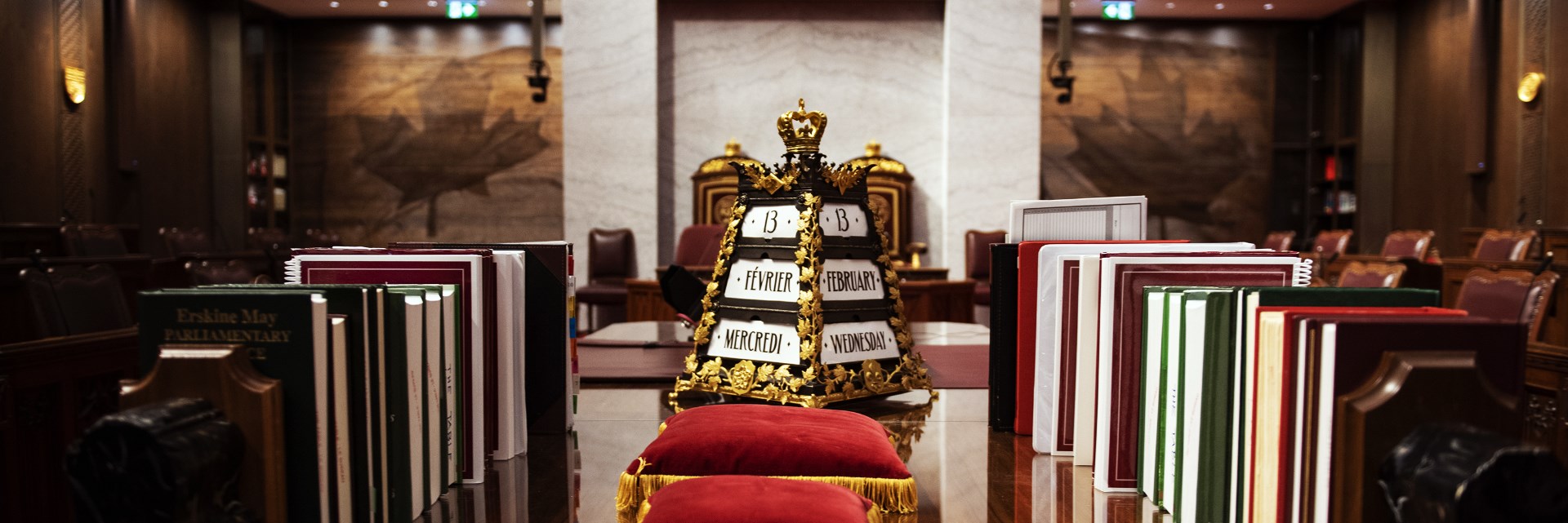Chapter Sixteen: Messages to the Senate and Relations Between the Houses
Messages from the Crown
16-1. (1) The Sovereign, the Governor General and any of the Deputies of the Governor General shall have unimpeded access to the Senate Chamber at all times and, in particular, when the Senate is sitting.
16-1. (2) When the Speaker receives a message that the Sovereign, the Governor General or a deputy will come to the Senate at a given time for any reason, that time shall be fixed for the beginning of that event.
16-1. (3)(a) Except as provided in paragraph (b), the Speaker shall read a message from the Crown upon receipt, interrupting the proceedings if necessary. Times for debate remain unaffected if debate is interrupted.
16-1. (3)(b) If a message is received during a standing vote, the Speaker shall read the message immediately after announcing the result.
16-1. (4) When a message has fixed the time for an event, no motion to adjourn the Senate shall be received. In addition, the rules regarding the ordinary time of adjournment or suspension, or any prior order regarding adjournment shall be suspended until the event relating to the message has concluded.
16-1. (5) If the Senate completes the business for the day before the time fixed in the message, the Speaker shall suspend the sitting. Before this suspension, the Speaker shall indicate:
(a) when the sitting shall resume, which shall be at least five minutes before the time fixed in the message for the event; and
(b) the length of time the bells shall ring before the sitting resumes, which shall be a minimum of five minutes if practicable.
16-1. (6) When a standing vote would conflict with an event relating to the message, the vote shall be postponed until immediately after the conclusion of the event.
16-1. (7) At the time fixed in the message, the Speaker shall interrupt any proceeding then before the Senate. Proceedings on the interrupted business shall resume at the conclusion of the event announced in the message. Times for debate and other proceedings remain unaffected by this interruption.
16-1. (8) At any time after the completion of Orders of the Day, the Leader or Representative of the Government, or the Deputy Leader or Legislative Deputy of the Government may, if there are any bills awaiting Royal Assent, state that a message from the Crown concerning Royal Assent is expected. After this announcement no motion to adjourn the Senate shall be received and the rules regarding the ordinary time of adjournment or suspension, or any prior order regarding adjournment shall be suspended until the message has been received or either the Leader or Representative of the Government, or the Deputy Leader or Legislative Deputy of the Government indicates the message is no longer expected. If the Senate completes the business for the day before the message is received, the sitting shall be suspended to the call of the Speaker with the bells to ring for five minutes before the sitting resumes.
Messages Between the Houses and Conferences
16-2. (1) The Clerk shall arrange for the sending of messages from the Senate to the House of Commons and for the receipt of messages from that house.
16-2. (2) The Speaker shall read messages received from the House of Commons at the earliest appropriate time.
16-3. (1) When the Senate disagrees with amendments proposed by the House of Commons to a bill that originated in the Senate, the message accompanying the bill to the Commons shall state the reasons for this disagreement.
16-3. (2) When the House of Commons disagrees with amendments proposed by the Senate to a bill that originated in the Commons, and the Senate insists on any of its amendments, the message accompanying the bill to the Commons shall state the reasons.
16-3. (3) The Senate shall charge a committee with the task of drawing up the reasons required in a message under this rule.
16-3. (4) The Senate shall receive by message the reasons for the House of Commons either disagreeing with Senate amendments to bills or insisting on Commons amendments, unless the House of Commons at any time wishes to communicate these reasons at a conference.
16-3. (5) Any conference between the houses may be a free conference.
16-3. (6) A Senator shall not speak at a conference with the House of Commons unless the Senator is one of the committee.
16-4. (1) If the Senate receives a message from the House of Commons requesting that a Senator attend before that house or appear before one of its committees, the Senator may choose to do so, but only if the Senate, after considering the message, gives its permission. Without this permission the Senator shall not appear or attend after receipt of such a message, and shall not provide answers, either in writing or through counsel.
16-4. (2) In the absence of a message, a Senator may voluntarily appear before a House of Commons committee.
16-4. (3) Officers or employees of the Senate shall comply with the decision of the Senate, in response to a message from the Commons, as to whether they should attend before the House of Commons, appear before one of its committees or provide answers, either in writing or through counsel. Without such approval of the Senate, no officer or other employee of the Senate shall attend before the Commons or appear before one of its committees.
16-4. (4) A Senator or officer or other employee who, except as authorized under this rule, attends before the House of Commons, or appears before one of its committees or provides answers, either in writing or through counsel, may be committed by the Senate to the Usher of the Black Rod or to prison during the Senate’s pleasure.

